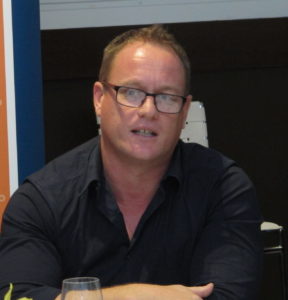This 2019 MDRT International Adviser Round Table discussion was intended to compare notes about the various challenges facing advisers around the world. We were anticipating we’d be reflecting on a variety of different challenges confronting advisers from different countries – but we were wrong.
Instead, when it came to what our adviser panellists consider to be the key challenges facing them, their advice business and their industry, there was only one ‘game in town’: Regulatory Reform…
Challenges Ahead for Advisers Around the World
Regulatory Reform
As we took a journey through each of the seven countries represented around the table, it quickly became apparent that virtually all other challenges or impediments to an adviser’s personal or business growth were dwarfed by the implementation and/or implications of, the various reform agendas currently sweeping the global financial services sector.
As this discussion developed, there emerged a sense that, whatever reforms are happening in your part of the world have either already been implemented elsewhere, are in transition now, or are slated to be rolled out in future.
What we did learn, though, is that some countries appear to be doing it better than others – at least from the perspective of our panellists – when it comes to finding a balance between serving and protecting the best interests of the consumer and implementing higher benchmark standards for advisers that will still enable them to build a successful business and deliver much-needed advice to those who need it most.
This Round Table report summarises and compares the impact of regulatory reforms across New Zealand, Australia, South Africa, Unites States, Canada, United Kingdom, and Greece (representing EuroZone countries).
While our panellists were only experts on what’s happening in their own country, it was still possible for conclusions to be drawn – and they were – around which countries our panellists think are approaching and implementing financial services regulatory reform with a balanced hand on the tiller…

2019 MDRT International Adviser Round Table Panel (L to R)
- Brendon Neal – CEO – Kepa, NZ
- Katrina Church – New Zealand MDRT adviser, MDRT Country Chair
- Adam McCann – Australian MDRT adviser, MDRT Oceania Chair
- Michelle Hoskin – Standards International, United Kingdom
- LC Maharaj – South Africa MDRT adviser, MDRT Chair, Southern Africa
- Duncan Glassey – UK MDRT adviser (first-time MDRT Annual Meeting attendee)
- Kyriakos Chatzistefanou – Greece/Euro Zone MDRT adviser, MDRT Country Chair
- Scott Brennan – US MDRT adviser and Past President MDRT
- Peter Sobels – Publisher, Riskinfo, RiskinfoNZ
- Michael Morrow – Canadian MDRT adviser, global presenter, author (inset)
New Zealand

Katrina Church
New Zealand’s MDRT National Chair, Katrina Church, got the ball rolling as she outlined the new adviser licensing regime commencing in November 2019. She said one of the big questions for Kiwi advisers is whether they will go down the path of obtaining their own Financial Advice Provider licence or whether they will join another provider and work under that provider’s licence.
She said there’s lots of uncertainty amongst NZ advisers, and that many are awaiting more details around future licensing issues to be released by the industry regulators.
Katrina shared with her peers some serious concerns among existing advisers, including concerns coming from the mature-age adviser population about their advising future and the future of their advice businesses. In particular, she said many mature-age advisers are struggling with being required to undertake more studies to achieve new minimum education standards after a lifetime career experience.
She said there hadn’t been a specific event or set of events that has led to this new round of regulatory reform in her country, but that it was, nonetheless, time for changes to compliance requirements as part of the world-wide momentum to drive the implementation of higher professional standards for financial advice. She said the reform agenda was “…very much like this around the world,” and that for New Zealand advisers “…it’s our turn.”
I don’t believe the regulators always understand what we do
Katrina said New Zealanders take note of what’s happening in Australia, but don’t necessarily follow the same path. In fact, the New Zealand financial advice sector is taking a different path.
Considering Australia’s regulatory reform requirements, Katrina agreed with its objectives but felt advisers weren’t receiving the support they should from the regulators during the transition period to the new regulatory regime.
“I don’t believe the regulators always understand what we do,” reflected Katrina. “Their job is to regulate, but I don’t think they really understand what’s involved [in serving clients’ needs].” She called for the industry to find a way to have regulators in all countries understand advisers better.

Brendon Neal
Still in New Zealand, Brendon Neal heads up Kepa, which is a significant adviser group in NZ. The dealer group comprises around ten percent of the independent advice sector in New Zealand. Thirty percent of Kepa’s adviser base is presently over the age of 60, but the trend is towards a lower average. Brendon told his peers that some advisers in this cohort are saying that the NZ minimum ‘Level 5’ standard of qualification and licencing requirements might be “…a bit much for them” to remain in the sector as an adviser. “That would be a real tragedy,” he said, adding, “those advisers have a wealth of knowledge, which would be a tragedy to lose.”
Brendon noted New Zealand’s life insurance market is already shrinking as a result of banks making major changes to their incentive structures and an ageing demographic of its advisers, a proportion of which may not continue beyond the date from which the new regulations will apply.
He noted the average life insurance premium for policies implemented by bank-based advisers is low (approx. NZ$700 per annum), while an independent adviser’s average annual premium per policy is closer to $3,000 per annum.
Due to the exit of the banks from life insurance advice, Brendon identified the ‘middle market’ as becoming significantly under-serviced.
He feels there’s a massive client opportunity for advisers, given the exit of bank-owned advice and the emergence of the Kiwi Saver superannuation initiative. He added the coming NZ regulatory reform agenda may present significant opportunities for the NZ advice market.
Brendon sees new minimum qualifications and new standards – new regulations – as a great opportunity for NZ advisers and the broader financial services sector.
He says NZ tends to follow regulatory reform in other parts of the world, but – to its credit – it distils the best elements of other reforms and applies those to the NZ environment as appropriate.
Australia

Adam McCann
Highly respected Australian adviser and MDRT contributor, Adam McCann, told his peers the Australian advice sector was undergoing significant change, where regulatory reform has been almost constant since the introduction of the country’s ‘Future of Financial Advice’ reforms in 2012. He outlined the client opt-in provision required of all advisers, in order to be able to charge clients an ongoing annual fee for investment advice.
He also noted grandfathered investment and superannuation commission provisions accompanying the introduction of the 2012 FoFA reforms have since been reversed, while in more recent times, the 2018 Australian Banking Royal Commission shone a light on the extent to which the country’s regulatory reforms had been effective in protecting the best interests of consumers.
There was a consensus among the panel that the Australian Royal Commission into Misconduct in the Banking, Superannuation and Financial Services Industry was global news; not just news for Australia.
Adam also referenced the implementation of the Financial Advice Standards and Ethics Authority and its remit from the Government, which is around minimum education standards, a new and controversial Code of Ethics and an exam which must be passed by all Australian authorised representatives before 1 January 2021 (or 1 January 2022, if changes are accepted by Parliament).
Next on Adam’s list was the inherent conflict of interest that he says exists with ‘vertical integrated’ organisations, ie the conflicts that can arise when banks and other product manufacturers also own dealer groups who deliver financial advice.
In noting banks are now divesting themselves of dealer group licensee firms, Adam then focussed on Australia’s Life Insurance Framework remuneration reforms, which are restricting the maximum commissions built into product premiums that advisers can charge for the delivery of their life insurance advice.
Industry participants, associations and advisers need to set the tone around what needs to happen from this point, says Adam, who believes in choice when it comes to adviser remuneration, as long as it’s transparent to the consumer – to the client.
Adam’s speculation is that Australia will eventually emerge with a maximum 40 percent upfront commission rate for risk advice.
Summarising what he thinks are the biggest challenges for Australian advisers, especially for those who have been advising many years, Adam singled out the new minimum education (FASEA) requirements, coupled with the removal of grandfathered investment and superannuation commissions.
For the more recent crop of advisers, though, Adam thinks there will be much less impact. He feels the licensees didn’t really deliver what the regulator and government intended via the 2012 FoFA reforms. “Now they’re making it happen, I think that’s fantastic,” he said.
Adam’s guess is that 30 – 40 percent of existing advisers will exit the sector because of the reforms.
United Kingdom

Duncan Glassey
Duncan Glassey feels his environment in the UK is different from those of many other countries. He set up his practice 12 years ago and has never taken commission in any form. He runs a comprehensive holistic financial planning service.
He discloses three tiers of fees:
- Cost of the investment management component
- A monthly fee if a custodian service is involved
- The adviser service fee
Previously expressed in percentage terms in relation to the money they are managing, Duncan says since 2019 in the UK, the adviser must now advise in pounds and pence the exact amount they are charging. He’s not sure quite yet whether this will be an issue.
“As we move to ‘adviser charging’, which is agreed remuneration with the client, a lot of advisory firms have kept to the old commission model,” said Duncan. “And they’ve just converted that percentage amount to a monetary amount without taking the time to establish whether that is the right way forward for the business – or the client.”
For Duncan, however, the biggest issue in the UK is that there aren’t enough advisers. “Advisers are at Level 4 and are moving towards Level 6. But there’re just not enough planners in the UK,” says Duncan.
He says there are only a handful of universities that teach financial planning, but the country and the system doesn’t have the infrastructure to accommodate more.
He clarified the UK advice sector is not dominated by banks: “There are lots of small practices making decent returns, but they don’t necessarily want to bring on the next generation,” he cautioned.
since 2019 in the UK, the adviser must now advise in pounds and pence the exact amount they are charging
“RDR [the 2012 UK Retail Distribution Review] was about fee disclosure and justifying to clients the fees you charge and how you add value,” said Duncan, adding that he thinks advisers are trying to add more value than ever before: “And they have to prove they regularly contact the client to justify the fees they charge.”
Duncan says commissions still exist on insurance advice and on mortgage policies in the UK, but investment commissions are banned.

Michelle Hoskin
UK best practice benchmark consulting firm Principal, Michelle Hoskin, referenced 2005 consumer research in the UK, which she said established 70 percent of consumers just didn’t trust financial advisers.
Following the design and launch of an international standard for financial planning to address that low trust factor, the key problem in the UK, according to Michelle, is the regulator’s pre-occupation with academic qualifications. She says Australian advisers are being forced to become obsessed with academic qualifications, while UK planners are also obsessed with them.
Michelle cautioned that those planners who are obsessed with their qualifications can often feel they’re professional because of how smart they are. “But that doesn’t make them trustworthy, ethical, good at business or approachable,” she said.
“First thing is that you can have the most qualified crook in the industry sitting in front of a client,” she said. “The fact that they have those qualifications doesn’t mean they can’t still be a crook.”
Michelle agrees the world has gone nuts with regulatory reform: “Sadly, we’re regulating and will continue to regulate the lowest common denominator,” she said, predicting regulatory reform will continue to unfold. She thinks it will happen in all industries forever, in all countries.
“The biggest challenge we have in the UK is a lack of bravery; a lack of self-worth,” she said.
On being made to disclose their fees following the implementation of the 2012 RDR reforms, Michelle said some advisers appreciated the value of the advice they delivered wasn’t worth the amounts they charged – that their fees didn’t reflect the value they provided.
“Generally, the profession isn’t being brave,” she said.
“In the UK we don’t have life insurance salesmen. Very few ‘sell’ life insurance. Very few talk about life insurance,” said Michelle.
those advice practices that are run like businesses don’t have any of those problems we’ve been talking about
She said the UK sector is not in the business of selling life insurance: “Really, … we’re in the business of making it possible for people to have the most fruitful and enjoyable lifestyle, which can continue beyond their own generation in death.”
In asserting the advice profession is being run globally by professionals, Michelle advocated that instead, “…we need the profession to be run like a business – by businessmen and businesswomen. Because those advice practices that are run like businesses don’t have any of those problems we’ve been talking about. They’re already way passed the regulatory reforms.”
Greece/Eurozone

Kyriakos Chatzistefanou
According to Greece’s Kyriakos Chatzistefanou regulatory reform in his country hasn’t reached the levels of those articulated by his peers to be taking place in New Zealand, Australia and the UK.
He says the lower appetite for of industry reform in his country means the Greek advice sector isn’t perceived by the public as being ‘professional’ as yet.
“To be an insurance agent, you must read textbooks, and pass an exam, “said Kyriacos, who added this may take around 19 hours of study or lessons.
He advocates bringing in CFP-equivalent qualifications to Greece and is working with organisations to make this happen.
In the memantine, however, of the 80,000 agents he says operate in Greece, there are perhaps 40 or 50 who are members of MDRT and no more than 150 who he would classify as being ‘professional agents’ in his country.
Kyriacos says the general level of advice standards and qualifications is lower in Greece than it should be.
He sees an opportunity for advisers to be proactive in areas such as commission and fee disclosure, which he thinks should be inserted in clients’ documents, but he says the product manufacturers are hesitant to do this.
From the start of 2019, Kyriacos says EuroZone requirements dictate that all advisers in all EuroZone countries must have their client sign a needs analysis and have that recorded in a client contract.
He says many current practitioners became advisers as a second profession after other careers, eg military, banking and the public service. But while this is a challenge, Kyriacos sees it as an opportunity for him to differentiate his own advice proposition based on the value he provides, rather than relying on product pricing.
United States

Scott Brennan
Scott Brennan is a long-time adviser and 2012 MDRT President. The perspective he related to his peers is that he lives and works in a very young country and embraces the theory of positive expectation when considering challenges. “I look for what’s right; not for what’s wrong,” said Scott – because he says he was born that way.
Scott summarised the challenges to the financial advice profession that were inherent in the Department of Labor Fiduciary Rule reform proposals, introduced under President Obama’s administration. He said the US Federal Government was seeking more involvement and more control within the business of retirement advice via the Dept of Labor.
It took a long time to get really good at this and it’s a hard-won dignity
He said the present Republican administration under President Trump put a pause on the Department of Labor reforms – a pause which Scott said was welcomed by the US adviser community. He conceded the reforms, which focussed mostly around investment, annuity and pension products certainly wouldn’t have been as impactful on life insurance focussed advisers as those who managed money:
By contrast, Scott said “I’m in the human nature business. I don’t manage money and I don’t manage people. I still love to sell life insurance,” he stated proudly – and he’s been very good at it for a very long time, serving the best interests and life insurance needs of refuse workers, Fortune 100 company CEOs and everyone in between.
“It took a long time to get really good at this and it’s a hard-won dignity. You don’t just wake up and become really good at this,” said Scott.
He shared with the panel that he continues to struggle every day with getting the message through to the consumer that they need to raise the bar of their own financial circumstances and responsibilities. Scott referenced a survey that revealed one third of Americans wouldn’t be able to pay an unexpected $400 bill.
Looking at impediments to helping consumers raise the bar, Scott singled out government red tape, which he says is challenging for even simple client contracts.
He also has concerns around second generation family advisers, who he says no longer want to sell life insurance, preferring rather to ‘manage money’. Scott cautioned, though, that selling life insurance – particularly at the high end – is an art:
“It’s a profession of stories,” said Scott, who implied the capacity for the emerging generation of US advisers to tell stories is being lost, as the collective wisdom of the life insurance advice sector – much of it residing within the baby boomer generation – departs the industry.
Canada

Michael Morrow
Our panel from seven different countries was very impressed with Michael Morrow’s report card on regulatory reform in Canada.
Michael highlighted the value of the Financial Advisers Association of Canada, the country’s peak professional adviser association, which he says holds a “really good” relationship with the Canadian Government and its regulators.
Michael also credits the Canadian Government with being very good at listening first and acting accordingly and, only then, in a measured way.
He said there was a collective approach in Canada which was highly mindful of not creating barriers to purchase. “If they make the barriers too high, no-one will purchase anything,” Michael told his peers.
Referring to the Government and its regulators, Michael commented, “They’ve weighed up a less-regulated system where more people purchase insurance and investment solutions with a more regulated environment, but where less people have cover or investment solutions.”
He says this collaborative approach was a huge victory for both advisers and their clients. He added that his Government knows things are changing, but it wants to progress slowly and consider ‘the greater good’ before changing anything, ie more regulatory reforms/barriers.
Michael cautions that, while he believes the ‘hasten slowly’ approach in Canada is a great thing, one of the downsides can be less disclosure for clients on adviser remuneration, including insurance commissions.
It’s a balance between protecting the consumer and having enough advisers to deliver advice
Generally, though, he believes – and the panel also agreed – “Canada stacks up well,” in terms of its more balanced approach to compliance and regulation and ability for more citizens to access advice and coverage.
Michael’s great question is whether society is better or worse off by having lower regulatory barriers to delivering and receiving advice: “It’s a balance between protecting the consumer and having enough advisers to deliver advice,” he said.
Michael noted Canadian advisers, like those in the United Kingdom, must also articulate dollar value, as opposed to a percentage.
He says the whole Canadian financial advice system is like global retailer, Tiffany’s, which he likened to ladies and gentlemen being trained to be ladies and gentlemen “…and the abuses that are out there are quite rare,” says Michael.
South Africa

LC Maharaj
Specialist risk adviser, LC Maharaj articulated to his peers what he characterised as his serious concerns about the direction of legislation in South Africa:
“Respectfully – I think we’ve lost the plot…,” said LC, referring to regulatory reform in both his own country and on a global level.
“We’re in the business of selling life insurance,” said LC. “We’re not in the business of regulating people.”
LC concedes this global regulatory push is taking place “…because some people in some countries have abused the system.”
He also made the point that all industries contain those who will want to short-circuit the system.
“We have a dichotomy,” said LC, where he reflected that the challenge was now in articulating what value advisers bring to the client:
“But what’s happened now is the entire thing has shifted to regulation and which regulation is of value for the client. How is value provided?
“Advice is a tool we use to sell the product. But the [regulatory] literature is talking more about giving advice. Our tools are simple: a financial needs analysis is our advice. If there’s a gap, you sell to the need. So, in the end, you’re selling product,” he said.
“What’s happened is that some countries have taken this to a very clinical level, and they have over-benched their requirements. Sadly,” according to LC, “…South Africa has hinged onto that over-regulated approach.”
He said South Africa is an emerging market – a third-world country with a population of 58 million people in which less than ten percent of people have insurance.
Respectfully – I think we’ve lost the plot…
“So, our purpose should be to make sure that if you have $10 or $20 extra per month, we can provide products that will suit the client’s budget. But South Africa thinks it needs to keep up with other more regulated countries, where they think more regulation and reforms will solve the problem,” he said.
In a pragmatic assessment, LC told his peers “Throughout the world, our job is to put insurance on the table – to make sure that the family is covered – not totally, because they can’t afford it, but at least some.”
In a refreshing observation, LC said “South African consumers look up to life insurance agents. They don’t shun them.”
He said there were two main barriers to entry for emerging advisers in South Africa:
- Lack of new advisers – LC’s son left the sector because it just wasn’t for him. Just not for me.
- Mature age advisers who won’t take an exam or work with such high compliance burdens
“The worst thing is that I have to come to you every year and if I don’t, I can be de-barred,” said LC.
Final Observations
Michael Morrow
“Is society better off under the current laws? If you change them, maybe you’ll be right by changing those rules. You can be right [to change the rules], and this can still be wrong [for the community].
Michael pointed out that if advisers have the opportunity to be well-paid it will encourage more to enter the business, which will lead to more consumers receiving more advice.
If advisers are underpaid for the value they deliver, and if the regulatory benchmarks are set too high, it will discourage many from entering the sector in the first place, says Michael, which in turn will mean less consumers will have access to great advice – thereby defeating the intended purpose of regulated reform.
Adam McCann
“If you provide value, you don’t need to be frightened of regulation.
fewer advisers will be delivering advice post the implementation of the current Australian regulatory reforms
“If you can articulate the way you’re helping people, they’ll pay for it,” says Adam, who thinks fewer advisers will be delivering advice post the implementation of the current Australian regulatory reforms, which will lead to a gap where people will not be provided with advice.
Adam’s concern is effectively with the ‘mums and dads’ market, where that group in the community will not put aside their $5 – $10 per week to save for a rainy day.
Duncan Glassey
While over-compliance is driving a more comprehensive advice service, sadly, at the same time, a comprehensive service can only be delivered to a smaller number of people who can afford it, which Duncan agrees defeats the purpose of the reforms in the first place.
He thinks Artificial Intelligence and robo-advice will emerge and will support a lot of people who can’t afford comprehensive personal advice. “But for all of us who provide comprehensive advice, I think we can learn a lot from Scott about his passion for the profession and I think MDRT is filled with passionate people who want to do the right thing by the client and we should have more of that in the UK.”
Kyriakos Chatzistefanou
“Our business is to sell life insurance. No-one knows what it’s like when I’m sitting at the table with the client – crying with him, talking with him – in order to support him in his life. This is my job. This is what I’m doing every day.
“Whatever regulatory changes are coming won’t change what I do. My job is to be outside the office, seeing my clients. My job is not to be in the office.
“Whatever changes are required – I’ll make those changes. I’ll qualify for the new standards. But it won’t change what I do.”
Scott Brennan
“Buying life insurance is not a transaction. It’s an exchange of emotion. And any time I visit my congressman or my Senator, I tell them that.
“Remind your elected officials of the same thing – this isn’t a transaction. It’s an exchange of emotion.
Buying life insurance is not a transaction. It’s an exchange of emotion
“People have got to love somebody to but this product.”
Scotty thinks elected members and regulators don’t understand the life insurance narrative deeply enough. He believes there is a lack of emotion – a lack of connection – between regulators and life insurance advice. “And we have to remind them. I know I always have.”
“This is not a commercial transaction. This is not a financial play. People buy this because they love someone.”
LC Maharaj
“We are an emerging country, where the majority of the population is not insured, and our government is following developed countries in adopting higher levels of regulation.
One size doesn’t fit all, warned LC – his point being there should be access to high-quality advice for people in a high income bracket, but regulatory reform and their associated costs and benchmark hurdles may prevent advisers from delivering their services to the people who don’t earn enough to feed their family.
“Giving advice to low-income groups should mean we’re allowed to provide a needs analysis, see what the person can actually afford, get the needs analysis signed-off and get the policy in place,” said LC. “That way, we can get a huge number of people insured. One size does not fit all,” he stressed.
“I love the Canadian model – where the government listens to the practitioners.”
Katrina Church
From a ‘matter-of-fact’ perspective, Katrina noted for her Kiwi colleagues, “Compliance is coming.”
She told her peers from around the world she’s enjoyed compiling a process manual for her business this year [ahead of new regulations], “…which has cost a lot of money and taken a huge amount of commitment.
“But it was such a gift,” she added, “…because all the people in my team now understand more thoroughly how to act and how to behave. And I realise that I hadn’t trained them as well in how I expected them to work. What a great gift that was. I made them better along the journey of our becoming a better company. That’s what compliance has done to our practice this year. We now act in a better way.”
Because of capacity issues, Katrina is also investing in Artificial Intelligence for her business.
Technology and compliance can actually allow us to get out there and talk to more people
“There’s no reason two of my staff need to be sending 500 arrears notices to my clients – which compliance requirements require me to do – because a robot’s going to do that between 2.00am and 3.00am every night. None of my staff are going to be spending the day calling our clients to solve my clients’ problems.
“Technology and compliance can actually allow us to get out there and talk to more people,” concluded Katrina.
Michelle Hoskin
“The whole education piece is old news, because it’s firmly here,” said Michelle in her concluding comments. For Michelle, it’s not about new minimum education standards but rather who is going to replace the current cohort of great advisers.
She forecast the biggest challenge for advice businesses around the world is business succession:
“I want to have a conversation about what happens next in your business. Who’s taking over? Who’s taking over the servicing? How are you going to exit? When are you going to exit? The problem is that advisers think their business is worth a lot of money to sell and that there will be a lot of people who want to buy it. The reality is they’re not worth much and nobody wants to buy it,” she warned.
Brendon Neal
As a Kiwi, Brendon said he had to grow up watching the All Blacks rugby union team “…lose every World Cup since 1987. But things turned around,” he said.
Brendon referenced the All Blacks response when things didn’t go to plan – and the winning results that emanated from that analysis. He applied that response to the NZ advice sector, where he says the industry must focus on the challenge of regulatory reform, address them and find a way to move ahead, and to be better for the effort and for the experience.
“We’re going to focus on the psychology of getting through [regulatory reform], and seeing the opportunities that lie ahead, rather than fearing it – and appreciate that this is all happening regardless – and work out what a great advice business looks like ten years from now.
Editor’s Note
Riskinfo sincerely thanks our panel: Katrina, Brendon, Adam, Kyriacos, Scott, LC, Duncan, Michelle and Michael for their fantastic contribution to this year’s MDRT Annual Meeting International Adviser Round Table.
We also extend our thanks to the MDRT organisation and its dedicated team for their support and assistance in delivering this Round Table production.
Look out soon for our next International Adviser Round Table – conducted at the inaugural MDRT Global Conference in Sydney – where another panel of MDRT advisers shared their thoughts on the future opportunities which lie ahead for themselves and for their advice businesses…

